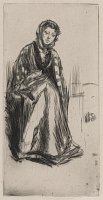Etchings Institutions search term: copley society
The Scotch Widow | ||
| Number: | 147 | |
| Date: | 1875/1876 | |
| Medium: | drypoint | |
| Size: | 205 x 103 mm | |
| Signed: | butterfly at right | |
| Inscribed: | no | |
| Set/Publication: | 'Cancelled Plates', 1879 | |
| No. of States: | 1 | |
| Known impressions: | 18 | |
| Catalogues: | K.142; M.140; W.118 | |
| Impressions taken from this plate (18) | ||
KEYWORD
cancelled plate, clothing, dress, model, mourning, portrait, woman seated.
TITLE
With one exception, the title 'The Scotch Widow' was used consistently by the artist and by cataloguers, as follows:
'The Scotch widow' (1875/1876, Whistler). 3
'Little Widow' (1877, Charles Augustus Howell (1840?-1890)). 4
'The Scotch Widow' (1886, Frederick Wedmore (1844-1921)). 5
It is possible that the sitter was not Scottish, and that it was her plaid cloak that suggested the title. This would explain why C. A. Howell called it only 'Little Widow'. However, this is not sufficient reason to change the title by which the drypoint has long been known.
'The Scotch widow' (1875/1876, Whistler). 3
'Little Widow' (1877, Charles Augustus Howell (1840?-1890)). 4
'The Scotch Widow' (1886, Frederick Wedmore (1844-1921)). 5
It is possible that the sitter was not Scottish, and that it was her plaid cloak that suggested the title. This would explain why C. A. Howell called it only 'Little Widow'. However, this is not sufficient reason to change the title by which the drypoint has long been known.
4: Howell to Whistler, [6-15 November 1877], GUW #01278.
5: Wedmore 1886 A (cat. no. 118).
DESCRIPTION
A dark-haired woman sits facing the artist, leaning slightly forward. She wears a scarf or hood around her head, and a tartan shawl over a dark bodice or jacket and light-coloured plain skirt. Her arms and left hand are concealed by the folds of the shawl, and her right hand rests in her lap. She casts a strong shadow behind and to left. There is the suggestion of a wall or dado to right.
SITTER
Whistler's maternal grandfather had emigrated from Scotland and the artist was still in touch with some relatives, as well as Scottish friends who had settled in London and some collectors and art dealers. However, this woman has not been identified.
DISCUSSION
This is a slightly unusual study, a portrait of a woman who is not in fashionable dress. It is probably a coincidence that Whistler painted Maud Franklin (1857- ca 1941) as a Scottish woman in the following year, in Arrangement in Yellow and Grey: Effie Deans
[y183]. However, Whistler did occasionally draw or paint models 'dressed up' in oriental or semi-classical robes so it is also possible that the shawl suggested a new subject.

